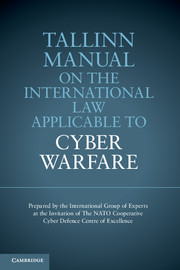Book contents
- Frontmatter
- Contents
- The International Group of Experts and Participants
- Short form citations
- Introduction
- Part I International cyber security law
- Part II The law of cyber armed conflict
- 3 The law of armed conflict generally
- 4 Conduct of hostilities
- 5 Certain persons, objects, and activities
- 6 Occupation
- 7 Neutrality
- Glossary
- Index
- References
5 - Certain persons, objects, and activities
Published online by Cambridge University Press: 05 March 2013
- Frontmatter
- Contents
- The International Group of Experts and Participants
- Short form citations
- Introduction
- Part I International cyber security law
- Part II The law of cyber armed conflict
- 3 The law of armed conflict generally
- 4 Conduct of hostilities
- 5 Certain persons, objects, and activities
- 6 Occupation
- 7 Neutrality
- Glossary
- Index
- References
Summary
In addition to the general protection afforded to civilians and civilian objects, the law of armed conflict makes particular provision as to the protection of specific classes of persons, objects, and activities. The Rules set forth in this chapter apply these provisions in the cyber context.
These Rules are without prejudice to the right of the parties to a conflict to enter into special agreements. They may agree at any time to protect persons or objects not otherwise covered by the law of armed conflict, as well as to make additional provisions for protected persons or objects beyond those required by that law. As a rule, special agreements may only be concluded with a view to enhancing protection. For example, the parties to a conflict may conclude a special agreement providing greater protection for computers and computer networks supporting the operation of works and installations containing dangerous forces than that set forth in Rule 80 by agreeing to an absolute prohibition on attacks against them, whether by cyber or kinetic means. Similarly, a special agreement could be concluded to protect computers and computer networks supporting sensitive facilities not addressed by the Rule, such as oil production installations, oil drilling platforms, petroleum storage facilities, oil refineries, or chemical production facilities. The unique nature of cyberspace and the activities that occur therein may render such agreements particularly relevant and useful. An impartial humanitarian organization, such as the International Committee of the Red Cross, may facilitate the conclusion and implementation of special agreements.
- Type
- Chapter
- Information
- Publisher: Cambridge University PressPrint publication year: 2013



